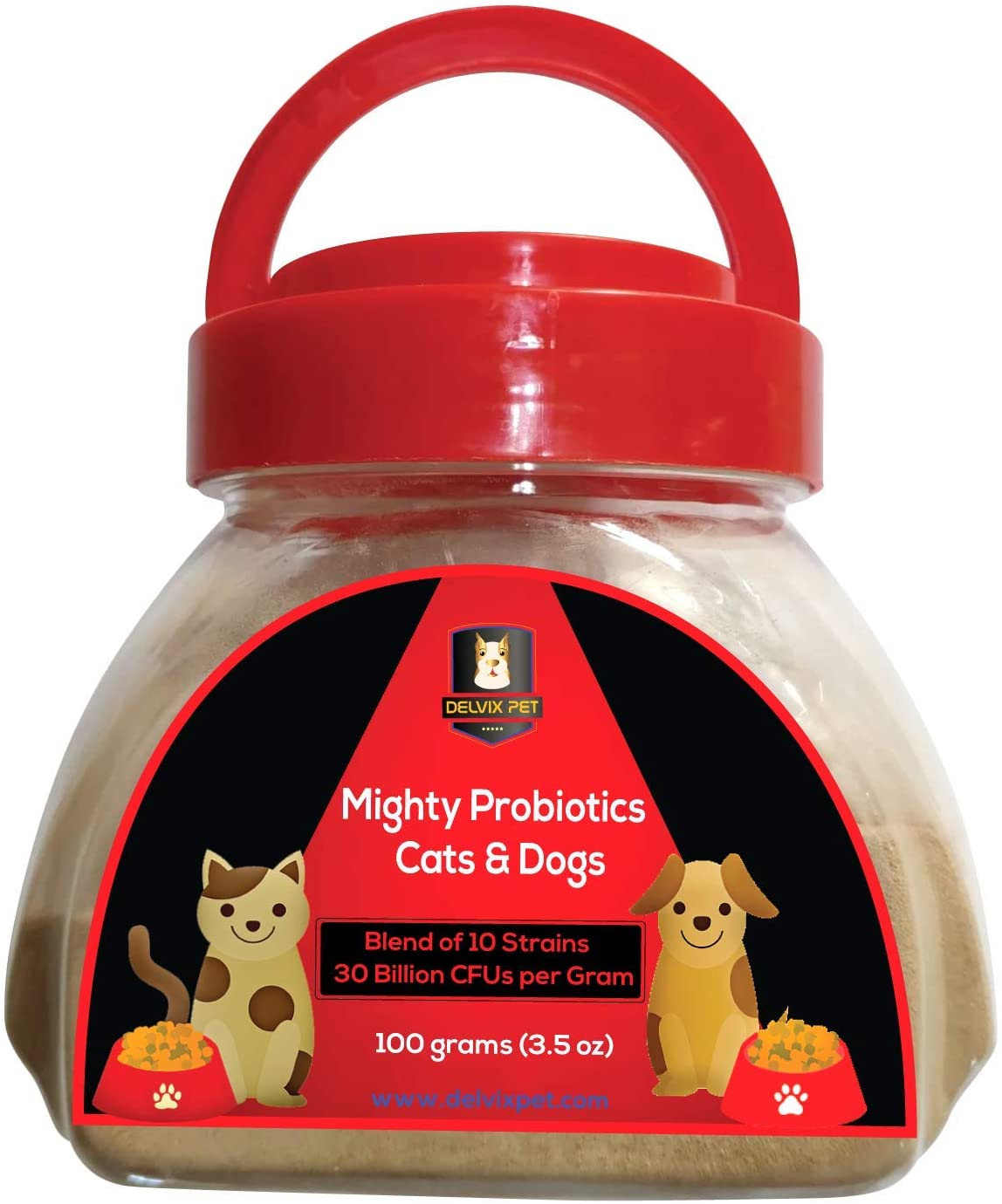Table of Contents
There are many probiotics for dogs and cats on the market but not all of them are the same quality. In this article, you will discover how to choose the best dog probiotics along with simple tips on how to use them.
But before going further, do you know what probiotics are? If yes, bravo! If no, the answer is simple: Probiotics are beneficial bacteria that live in the digestive tract. The word “probiotics” originates from the Latin preposition “pro” meaning “for” and the Greek word “bios” meaning “life”. So, it literally translates to “for life”.
Among others, dog probiotics contribute to a healthy bacterial balance in dogs’ guts. Therefore, as the digestive tract contains approximately 70% of all immune cells, keeping your dog’s digestive system healthy is essential to ensure its well-being. To do so, probiotics certainly are the way to go.
Discover 7 benefits of dog probiotics and simple tips to choose the best probiotic for your loving canine.
-
Dog Probiotics Can Alleviate Stress or Illness-Related Digestive Issues:
Sickness and stress may strongly affect a dog’s digestive system. As a matter of fact, they can disrupt the balance between healthy and illness-causing microbes within the canine’s gut. This imbalance can actually lead to health issues like diarrhea, gas, cramping and bad breath. Probiotics have shown to accelerate the disappearance of these symptoms from 7 to 4 days!
-
Probiotics Modulate the Dog’s Immune System:
In fact, probiotics produce short-chain fatty acids (SCFAs), which inhibit the growth and activity of harmful bacteria, such as E. coli, Salmonella, and Clostridium Perfringens. They also provide other benefits to the intestines. Studies have actually shown the effectiveness of certain strains in treating diarrhea, irritable bowel, and intestinal inflammation. Dog probiotics may also help prevent urinary tract infections and even reduce allergic reactions.
-
Dog Probiotics Decrease the Side Effects of Antibiotics:

It is becoming more and more known today that antibiotics do not differentiate between good and bad bacteria. Thus, while antibiotics may be effective at treating certain types of infection, they may cause diarrhea or other gastrointestinal disorders in your dog. Therefore, giving probiotics to your dog before, during and after the antibiotic treatment, will ward off those unpleasant side effects.
-
A Healthy Gut, A Pleasant Pup:
Healthy gut bacteria may positively impact your dog’s behavior. As it happens, like us humans, dogs with unhealthy gut bacteria and digestion problems may experience emotional issues. These problems may result in bad behaviors like excessive licking or other obsessive-compulsive actions. Studies have shown damages to the probiotic flora may lead to stress and sleep problem. So, in the process of aiding your dog’s digestive health, it is crucial to choose the best dog probiotic possible which can improve digestion and restore normal flora.
-
Dog Probiotics Help Reduce Skin Allergy Symptoms:
To understand this benefit, you should actually know what allergies are. An allergy is a hypersensitivity, an exaggerated and misguided immune system response towards a substance. Giving the fact that gut and immune health are so intertwined, giving your dog probiotics may restore healthy microbiota, which stimulates their growth and lessen skin allergy symptoms. As a matter of fact, several studies have proven this.
-
Dog Probiotics Improve Its Bone and Teeth’s Health:
Preliminary research suggests that giving your dog probiotics could also support its dental health along with the entire skeleton system. Some small studies conducted on probiotic strain Lactobacillus reuteri ATCC PTA 6475 have shown it can reduce bone loss and may thereby help strengthen bones and prevent certain dental problems. This actually enables you to avoid further poor teeth-health related symptoms such as bad breath, caries, etc.
-
Dog Probiotics Can Help Minimize Tummy Upsets Due to A Food Change:
If you’ve been feeding your dog the same food for a long time and suddenly make a switch, it is almost guaranteed that your canine companion will experience gastrointestinal distress as a result. To cleverly avoid this, before the change, get your dog’s digestive tract ready with probiotics. This will improve the balance between the ‘good’ and ‘bad’ bacteria before changing to a different food.
this, before the change, get your dog’s digestive tract ready with probiotics. This will improve the balance between the ‘good’ and ‘bad’ bacteria before changing to a different food.
To sum up, probiotics certainly are key to a dog’s health. However, it may be essential to choose the right probiotics for your canine. Generally, a good probiotics supplement would contain several different bacterial strains on the ingredient list. This is why we recommend Delvix Pet Mighty Probiotics Powder. It contains a blend of 10 strains and provides up to 30 billion CFUs per serving.
If you know other benefits of dog probiotics, kindly comment and share them with our readers.




